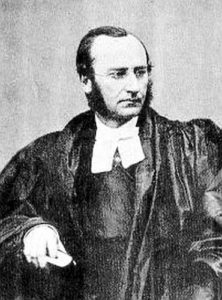 Well might Luther write upon the table at Marburg: “This is My body;” simple words, framed by infinite wisdom so as to resist the violence and all the ingenuity of men. Rationalism in vain essays to remove them with its cunning, its learning, an its philosophy. Fanaticism gnashes its teeth at them in vain. They are an immovable foundation for faith in the Sacramental mystery, and the gates of hell cannot shake the faith of the Church, that our Lord Jesus Christ with the true body and true blood which He gave for our redemption on the Cross, is truly present in the Holy Supper, to apply the redemption through the very organs by which it was wrought out. The sacrifice was made once for all—its application goes on to the end of time. The offense of the Master’s Cross now rests upon His table, and thither the triumph of the Cross shall follow it. On the Cross and at the table the saints discern the body of the Lord, and in simple faith are determined to know in both nothing but Jesus Christ and Him crucified.
Well might Luther write upon the table at Marburg: “This is My body;” simple words, framed by infinite wisdom so as to resist the violence and all the ingenuity of men. Rationalism in vain essays to remove them with its cunning, its learning, an its philosophy. Fanaticism gnashes its teeth at them in vain. They are an immovable foundation for faith in the Sacramental mystery, and the gates of hell cannot shake the faith of the Church, that our Lord Jesus Christ with the true body and true blood which He gave for our redemption on the Cross, is truly present in the Holy Supper, to apply the redemption through the very organs by which it was wrought out. The sacrifice was made once for all—its application goes on to the end of time. The offense of the Master’s Cross now rests upon His table, and thither the triumph of the Cross shall follow it. On the Cross and at the table the saints discern the body of the Lord, and in simple faith are determined to know in both nothing but Jesus Christ and Him crucified.

… [I]f it be granted that the presence of the body and blood of Christ in the Supper is one which is fixed, absolute, and unchanging, then it must be substantial, and not imaginary; not a thing of our minds, but of His wonderful person; not ideal, but true; faith does not make it, but finds it, unto life; unbelief does not unmake it, but, to its own condemnation, fails to discern it. The sacramental presence is fathomless, like the Incarnation; like it, also, it is in the sphere of supernatural reality, to which the natural is as the shadow. The presence of the communicant at the Supper belongs to a lower sphere of actuality than the presence of the undivided Christ in it; and the outward taking and eating is the divinely appointed means whereby the ineffable mystery of the communion of Christ’s body and blood is consummated, a communion heavenly and spiritual in its manner over against all that is earthly and fleshly; but in its essence more true than all earthly truth, more real than all earthly reality, more substantial than all earthly substance. The body and blood of Christ are more truly present in the Supper than are the bread and wine, because their sphere of presence is divine; the bread and wine are but the gifts of the hand of God, the body and blood of Christ are inseparable constituents of God’s incarnate person.
Charles Poterfield Krauth, The Conservative Reformation and Its Theology (Philadelphia: Lippincott, 1871; Philadelphia: General Council Publication Board, 1899), 619, 647-48.
Pfatteicher, Philip New Book of Festivals & Commemorations: A Proposed Common Calendar of Saints, 11-12
